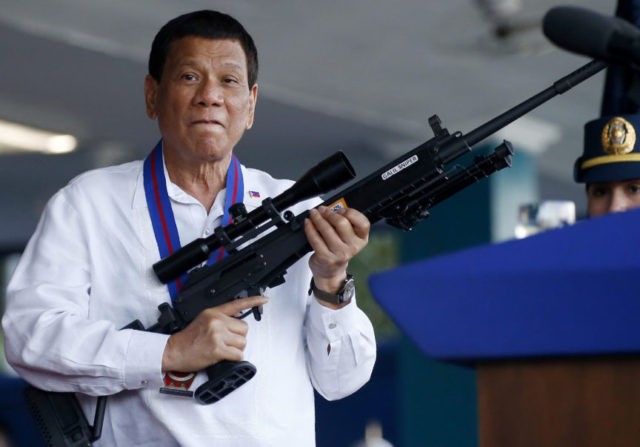Philippine President Rodrigo Duterte’s war on drugs had already been a source of great controversy for years when he suddenly announced a new crusade in June: a war on loitering.
Those who fear authoritarian rule were dismayed to discover squads of police combing the streets of Manila each night and rounding up thousands of people who could not provide a good enough explanation for why they were out after dark.
Reuters on Tuesday recalled Duterte launching the war on loitering during one of his characteristically long and rambling speeches on June 13. “People hanging out in the streets should be ordered home, and if they refused, he would personally tie their hands and drop them into a river,” Reuters said.
Duterte said that loiterers, or tambays as they are called in Tagalog, are “potential trouble to the public.”
There does not seem to have been any formal administrative directive from the Philippine president, but Duterte gave that particular speech to a group of freshly commissioned officers in the Philippine National Police force, so the PNP took it from there without further prompting.
The police in Manila ran out and arrested 59,000 people in the ensuing month for “crimes” such as wandering around shirtless, smoking and drinking alcohol outdoors, hanging around in computer game arcades, allowing their children to run wild, or even simply having a conversation on the side of the street.
A group of people who got arrested for having a conversation challenged the authority of the police to bust them for nothing. The Manila cops responded by showing them a video of Duterte’s June 13 speech and insisting his words have the force of law. Two of the officers involved were eventually fired over the incident.
There has been one fatality in the War on Loitering so far, a 25-year-old man named Genesis Argoncillo who was arrested for not wearing a shirt and subsequently beaten to death by his cellmates.
The police began releasing people more quickly after the incident to reduce the stress on Manila’s already crowded jails. Duterte claimed he never actually told the police to arrest anyone, while police officials insisted there is a fine distinction between arresting people and “accosting” them for aimless behavior.
At this point, the police are more likely to make an ominous show of recording information about offenders, collect a small fine, and release offenders immediately. The authorities also generously invited anyone who thinks they were inappropriately arrested for loitering to file a complaint, an option the poor of Manila are conspicuously nervous about exercising.
Human Rights Watch, already a persistent critic of Duterte’s bloody war on drugs, denounced the tambay campaign as a heavy-handed effort to intimidate poor people who were already traumatized from Duterte’s anti-drug campaign. Some Filipinos believe police officers are using the campaign as an excuse to shake people down for “fines” that disappear into the arresting officer’s pocket.
Manila’s slums are so overcrowded that the poor have little choice but to step outside their tiny shacks and tents to socialize in the streets or escape from the heat. Young people are constantly looking to pick up trash or run errands to earn a little extra money.
Opposition legislators are calling for a probe into the crackdown, which they say is little better than martial law under the dictatorship of Ferdinand Marcos 40 years ago. (Duterte probably would not take that comparison as an insult.)
“Loitering” is not actually a crime in the Philippines. It used to be, and Duterte might argue that it should be again, but vagrancy was formally decriminalized in 2012. Many of the tambay arrests are justified under local ordinances against things like public indecency, which is why a hefty share of those arrested were shirtless young men. Duterte said in late June that he wanted the police to confront loiterers and search them for drugs in accordance with laws upheld by the Philippine high court.
As Reuters points out, the Philippine public generally approves of Duterte’s tough-on-crime stance, favoring him with an 88 percent job approval rating even after 4,500 deaths in his war on drugs. His supporters say crime remains such a big problem that cracking down on vagrancy is a sensible public safety measure.

COMMENTS
Please let us know if you're having issues with commenting.